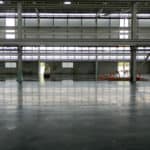So lockdown is over. Alex had fun being with his family, even if they tried to feed him wooden cakes! But now he’s back in the office, ready to talk about warehouse floors – underfoot and overlooked, but very important for the usefulness and value of the warehouse. How can they best be protected?
What Does a Warehouse Floor Need?

Invisible Strength
What Does a Warehouse Floor Need?
/
RSS Feed
What Does a Warehouse Floor Need?
New warehouse floors and other naked concrete (past webinar) invisible-strength.com/webinars/new-warehouse-floors-other-naked-concrete
Rejuvenating a warehouse floor? markhamglobal.com/rejuvenating-a-warehouse-floor
View the Transcript
BRENDAN: G’day all, and welcome to the latest podcast episode in MARKHAM’s Invisible Strength series. Today we’re hitting up the topic What Does a Warehouse Floor Need? I’m Brendan Stead, Marketing Coordinator, situated at the Bundaberg office, and I’ll be quizzing Alex Portelli, our Australian architectural consultant, who is situated in the Sydney office. Great to be back in the office, Alex? Tell our listeners a bit about what you do.
ALEX: Yes, thanks Brendan, yes excited to be out and back in the office. I’m sure lockdown has had its challenges for everyone. For me, my challenges were my little munchkins bringing me coffee every five minutes, and making me wooden cakes to eat! So that was always fun.
But no, as I said, good to be back in the office at MARKHAM. We’re a company going somewhere and looking to leave a legacy. My role is dedicated to working with architects and designers directly, to ensure the correct concrete product solutions are chosen to complement their design.
We take a lot of pride in what we do, resulting in our end-to-end service. Our end-to-end service covers the manufacturing of our products, designing them into the project, and providing specifications. We also install them on-site and provide a warranty for all work carried out. Having this service in the industry allows us to ensure that the architect’s design brief is met, and the asset owner is covered.
BRENDAN: That’s brilliant! So let’s charge into our subject, and to be honest, I have worked in factories and warehouses over the years and I’m wondering what the fuss is here. The floor is usually the most boring part of a very utilitarian building. So why are we focusing on the floors today?
ALEX: Yes, so we’ve got a little saying that underfoot is usually overlooked. Warehouse floors are very important indeed. They take the brunt of the abuse throughout the project’s life cycle and this is why we believe they need a lot of protection. Continual traffic from heavy loaded forklifts and trucks can take its toll on the warehouse floor; and not to mention the constant load from, you know, the weight of stock, pallet racking and machinery that’s stored, you know, in these warehouses. So usually this is where you find all those cracks throughout a warehouse floor. And that’s not what you want in your building.
BRENDAN: OK, fair enough. Tell us more about that; give us a bit more detail?
ALEX: Yes, no problem. So constant traffic will wear and abrade any warehouse floor and do two things. One, they make the floor uneven; as concrete is usually lost from the abraded parts of the surface; and two, it creates dust, which can in fact contribute to silicosis.
So of course, if you’ve got cracking and a degrading process, it will actually make it degrade a lot faster. Not a good situation to be in. Obviously, deterioration of the floor will reduce the usability of the warehouse and likewise its value. And the worst part is that the repairs can be quite expensive.
BRENDAN: OK, OK, I need to pay more respect to the floor next time I’m in the warehouse! So what do you suggest we do about this?
ALEX: Yes, so we recommend protecting the floor from day one; not just with a coating that can be worn away, but with an AQURON deep penetrating hydrogel sealer. It’s very important to go deep into the concrete. If you don’t, the slab can delaminate in its life. For example, if you were to use a surface densifier, it works well within, you know, the first 5mm of that slab. However, it does leave the rest of the concrete to rely on its nominated strength, and this will eventually break down, causing major issues. AQURON hydrogels are able to penetrate up to 150mm into the concrete matrix, in turn not allowing the slab to have any sort of soft spots near the surface.
AQURON hydrogel sealers will also enhance the concrete curing, equivalent to 14 days’ water ponding, and increase the abrasion resistance by up to 69%, giving you a very durable floor substrate.
BRENDAN: Right. So what does it look like when it’s finished?
ALEX: So the beauty of AQURON is that they do not change the appearance of the surface; or the texture for that matter. In saying that, because the hydrogel increases the density of the concrete it will start to shine up under constant use.
The beauty of our end-to-end service is that if you did require a floor to look a certain way for handover, we’re able to specify a range of other solutions that work in conjunction with our AQURON treatments.
BRENDAN: Right, that’s brilliant. Very good. So I have a specific question on that; what about line marking, zone delineations, and so on – can they be applied over the treatment?
ALEX: Yes, that’s a great question. So anything that can go on bare concrete can go on AQURON-treated concrete with no compatibility issues.
We do recommend that any topical product that needs to be applied still follows their standard procedures. This usually involves making sure there’s a sufficient “key” in the concrete for the product to actually stick to.
BRENDAN: OK. So what sort of warranty is offered with AQURON?
ALEX: Yes, if we’re directly involved with the supply and application, and can utilise our quality assurance system, we’re prepared to offer up to 15 years for that sort of project. Well in advance of other conventional sealers, which mostly have to be reapplied after five years. Keeping in mind that once we treat the concrete substrate we’re there for life. It’s not something that actually wears off. The best part of our warranty is that they’re performance-based; meaning we’ll warrant if the product fails to do its intended purpose, not just a product swap warranty.
BRENDAN: That’s very solid! Ah – no pun intended! And lastly, what about environmental hazards? I seem to recollect that some flooring chemicals such as chlorinated rubber or even acrylic sealers can be very high in VOCs. The applicators seem to have a lot of PPE just to get it on the floor.
ALEX: Yes, absolutely! So our products, these AQURON products, are very safe. The AQURON 1000 hydrogel is nil VOC. It’s actually been recently licenced to use the Environmental Choice NZ ecolabel, which is recognised by the Green Building Councils of New Zealand and Australia. A few of our other products have comparatively low VOC levels, and in most cases, respiratory protection is not required. As a precaution, we recommend protection for small or poorly ventilated areas. So by comparison with the chlorinated rubber you mentioned, it’s extremely safe to apply and use.
BRENDAN: Brilliant, that definitely sounds like the system of choice. Thanks for all that information, Alex, it’s been very helpful!
And to our listeners – if you want to find out more, head to our website markhamglobal.com; you can get in touch via the contact page, or try Percy the chatbot, and we’re keen to help you with your next project!
Thanks for listening, and don’t miss our next episode!
Want to Contribute?
Feedback on our podcasts? Suggestions for future topics? Looking for more information on topics we’ve discussed? Send us a message – we’ll be in touch within a day or two.
More about MARKHAM
MARKHAM are dedicated to providing innovations for concrete and construction. Focusing on concrete waterproofing solutions, penetrating concrete sealers and durability treatments for concrete.
Podcast Categories
Latest Episodes

Doug & Laike Share Their Week – Western Australia, Christchurch, and a Focus on Low Carbon Concrete
Laike and Doug wrap up their week again with a 10-minute chat. They’ve each been

Doug & Henry Share Their Week – R&D, Melbourne Traffic, Basement Waterproofing, And ‘CONQOR Your Health’
It’s Henry’s turn to join Doug in the podcast studio – in person this time!

Doug & Laike Share Their Week – Seychelles, Readymix Plants, And A Bike Ride
Once again Doug and Laike sit down for a 10 minute recap from the week.
invisible strength podcast
The whole MARKHAM team is pleased to present you with our podcast series, INVISIBLE STRENGTH. In this series of interviews, we’ll walk through the science and challenges of concrete durability, what goes wrong in the field – and the advanced methods available to restore and enhance service life to concrete construction.
INVISIBLE STRENGTH reflects a number of factors in concrete construction and durability. When things go wrong, the evidence can become very visible indeed. However, when all is going well, there’s nothing particular to be seen!
MARKHAM’s concrete treatments, too, are invisible once completed – and the result is the long internal, invisible durability of the concrete.
So join us as we explore the unseen world inside concrete – why it matters, and how it can be protected!

